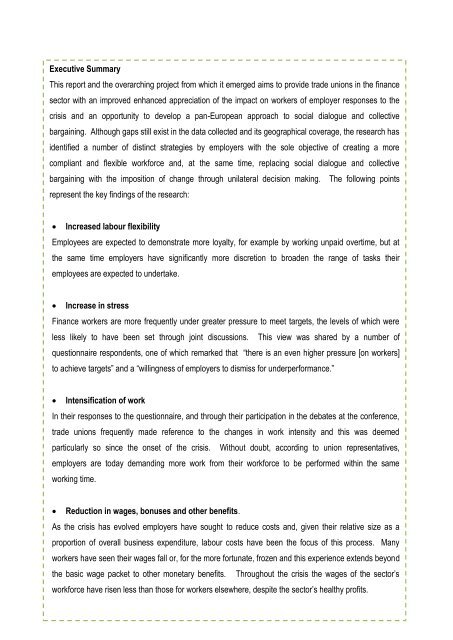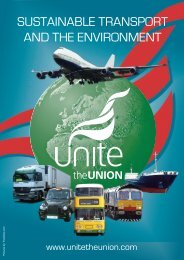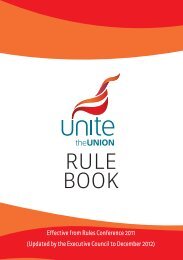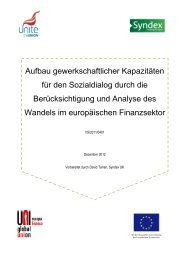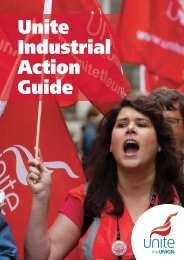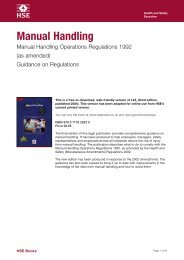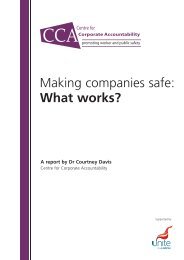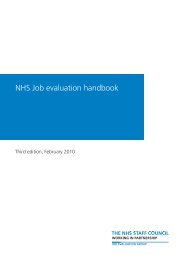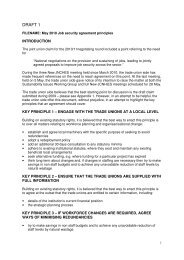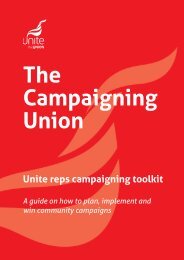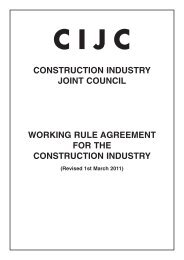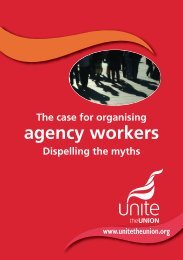Full report, English - Unite the Union
Full report, English - Unite the Union
Full report, English - Unite the Union
Create successful ePaper yourself
Turn your PDF publications into a flip-book with our unique Google optimized e-Paper software.
Executive Summary<br />
This <strong>report</strong> and <strong>the</strong> overarching project from which it emerged aims to provide trade unions in <strong>the</strong> finance<br />
sector with an improved enhanced appreciation of <strong>the</strong> impact on workers of employer responses to <strong>the</strong><br />
crisis and an opportunity to develop a pan-European approach to social dialogue and collective<br />
bargaining. Although gaps still exist in <strong>the</strong> data collected and its geographical coverage, <strong>the</strong> research has<br />
identified a number of distinct strategies by employers with <strong>the</strong> sole objective of creating a more<br />
compliant and flexible workforce and, at <strong>the</strong> same time, replacing social dialogue and collective<br />
bargaining with <strong>the</strong> imposition of change through unilateral decision making. The following points<br />
represent <strong>the</strong> key findings of <strong>the</strong> research:<br />
Increased labour flexibility<br />
Employees are expected to demonstrate more loyalty, for example by working unpaid overtime, but at<br />
<strong>the</strong> same time employers have significantly more discretion to broaden <strong>the</strong> range of tasks <strong>the</strong>ir<br />
employees are expected to undertake.<br />
Increase in stress<br />
Finance workers are more frequently under greater pressure to meet targets, <strong>the</strong> levels of which were<br />
less likely to have been set through joint discussions. This view was shared by a number of<br />
questionnaire respondents, one of which remarked that “<strong>the</strong>re is an even higher pressure [on workers]<br />
to achieve targets” and a “willingness of employers to dismiss for underperformance.”<br />
Intensification of work<br />
In <strong>the</strong>ir responses to <strong>the</strong> questionnaire, and through <strong>the</strong>ir participation in <strong>the</strong> debates at <strong>the</strong> conference,<br />
trade unions frequently made reference to <strong>the</strong> changes in work intensity and this was deemed<br />
particularly so since <strong>the</strong> onset of <strong>the</strong> crisis. Without doubt, according to union representatives,<br />
employers are today demanding more work from <strong>the</strong>ir workforce to be performed within <strong>the</strong> same<br />
working time.<br />
Reduction in wages, bonuses and o<strong>the</strong>r benefits.<br />
As <strong>the</strong> crisis has evolved employers have sought to reduce costs and, given <strong>the</strong>ir relative size as a<br />
proportion of overall business expenditure, labour costs have been <strong>the</strong> focus of this process. Many<br />
workers have seen <strong>the</strong>ir wages fall or, for <strong>the</strong> more fortunate, frozen and this experience extends beyond<br />
<strong>the</strong> basic wage packet to o<strong>the</strong>r monetary benefits. Throughout <strong>the</strong> crisis <strong>the</strong> wages of <strong>the</strong> sector’s<br />
workforce have risen less than those for workers elsewhere, despite <strong>the</strong> sector’s healthy profits.<br />
[4]


